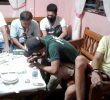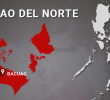DAVAO CITY—Some residents here are in favor of bringing back capital punishment in the country to curb criminality while others fear the poor will only suffer the backlash under what they dubbed as a “draconian measure” as showed in a random interview conducted by Davao Today.
Dan Majerli Sabando said he favored the death penalty for criminals who committed heinous crime saying “I do agree because heinous crimes are heinous, an eye for an eye on that matter.”
“There’s not much to ponder about how these people could change. We should focus more in helping the victims. It would be unfortunate if criminals can be pardoned anytime by any president, without victims getting the justice they deserve,” he said.
If death penalty would be approved, Sabando said that it would create a positive chilling effect to the public.
“Citizens would have to take plenty of time to think whether they should do a criminal act, a heinous criminal act. Having said that, this would change how the citizens would act, they would then follow the rules more,” he said.
Lea Laniza, 34, a housewife, said she favored the restoration of death penalty to lessen jail congestion.
“They already look like pigs there. The criminal rate will continue to increase if the death penalty will not be approved because criminals would not be scared to go to prison.”
On the other hand, Joselito Lagon, a student of Assumption College of Davao has expressed his disapproval, saying the proposed bill is “a draconian measure and will not really curb the number of crimes, whether heinous or not.”
“The rich can easily use the law in their favor and get away with murder, while poor offenders cannot,” Lagon said.
Lagon said the government should instead focus more on solving criminality and poverty.
“What the government should propose as well is stricter law implementation and reviewing criminal cases and penalties,” he said.
Lagon said the government should provide basic needs such as education, housing, health services for the poor.
Annabelle Buhawi, 42, a salon owner, is also against the proposal to revive capital punishment, saying the poor people will be the one who will suffer again.
“It’s easy to convict poor people that’s why they will be the one who will really experience death penalty and not the rich people because rich people have the power to escape. I pity the poor people because we know some of them did those heinous crimes because they don’t have jobs,” she said.
Not the solution
Jay Apiag, spokesperson of Karapatan Southern Mindanao said the even criminals have their rights.
Apiag urged President Rodrigo Duterte to address first the root cause of poverty.
“As long as the root cause of poverty will not be resolved, crime incidents will continue to increase because of the economic status of those who will commit crime,” he said.
Atty. Arnold C. Abejaron, an economics and law professor at the Ateneo de Davao University sees death penalty as a problem in a country with weak criminal justice system.
“If the country still has weak criminal justice system and the revival of the death penalty will be implemented then it will be a problem. It becomes a problem when innocent people will be convicted through death penalty because the justice system is weak,” he said.
But Abejaron said if the criminal justice here is strong death penalty will lessen crime incidents.
“Reducing crime is not solely dependent on the death penalty, it is good only if you make an arrest or able to convict because without arrest or conviction you will not reach the issue of penalty,” he said.
But Abejaron pointed out that if criminals know that there is a strong implementation of the law on death penalty, they will be scared.
Under the proposed revival of death penalty, the crimes to be punished by death include treason, carnapping, qualified piracy, criminal liability for planting evidence, unlawful prescription of dangerous drugs, qualified bribery, cultivation of plants classified as dangerous drugs, parricide, possession of dangerous drugs, murder, infanticide, rape, kidnapping and serious illegal detention, robbery with violence against intimidation of persons, manufacture of dangerous drugs, maintenance of a den, dive, resort, where drugs are used, sale, trading, administration, distribution of dangerous drugs, importation of dangerous drugs, plunder and destructive arson.
It can be recalled that Duterte, during the campaign period, has vowed to re-impose the death penalty under his administration to deliver his promise of cracking down criminality and illegal drugs in the country.
Human rights groups and the Roman Catholic Church, pro-life advocates, meanwhile, said that they would block any move to restore the death penalty in the country. (davaotoday.com)










